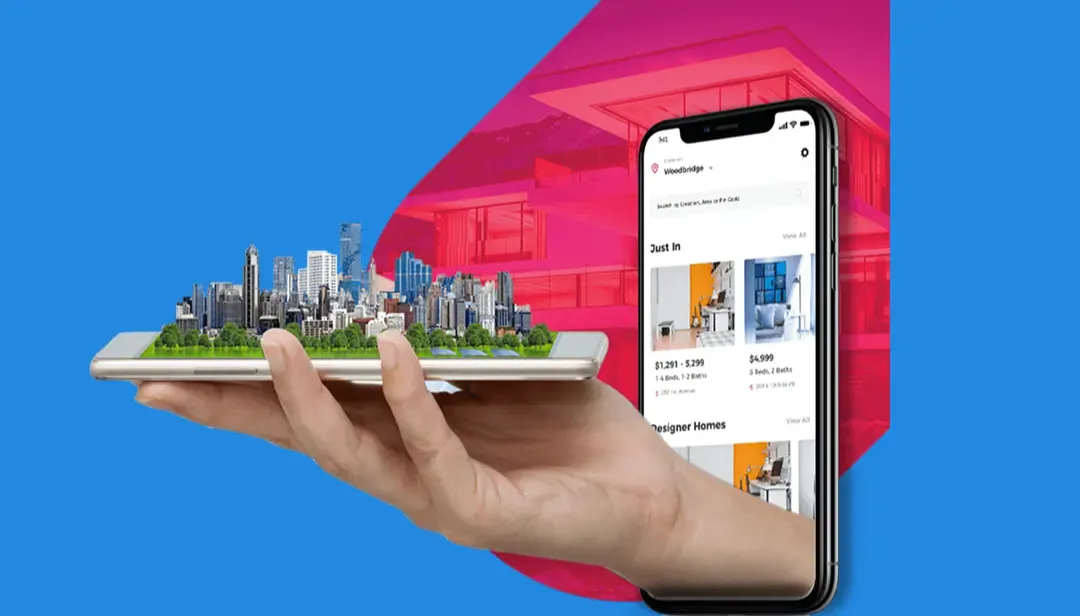How Much Does It Cost To Develop An App Like Magicbricks?

Dipti Singhal
Mar 29, 2025

Are you ready to embark on a digital journey through the captivating world of real estate? Imagine having the power to browse, compare, and purchase properties right from the comfort of your home. It's a game-changer, and it's made possible by real estate websites and apps.
One name that likely comes to mind when thinking about real estate tech giants is Magicbricks, a successful real estate app development project. This industry-leading platform has redefined the way we interact with the property market, offering a seamless and user-friendly experience that connects buyers, sellers, and renters.
But have you ever wondered about the magic behind Magicbricks? How much does it cost to build a real estate app and website that can compete in this fast-paced industry? The answer is a complex one, as it involves numerous factors and intricacies. Still, the average real estate app development cost lies in between $20,000 to $60,000 and more.
In this blog, we will embark on a journey to uncover the secrets of developing a real estate website and app that rivals Magicbricks, shedding light on the costs, features, and considerations that can make your real estate tech dream a reality. So, fasten your seatbelts and get ready to explore the enchanting realm of real estate technology!
Market Overview of Real Estate App Development
The real estate app development market is booming, with the global market size expected to reach $25.39 billion by 2030, growing at a CAGR of 12.8% from 2023 to 2030. This growth is being driven by a number of factors, including –
- The increasing reliance on mobile devices for all aspects of our lives, including real estate transactions.
- The growing popularity of online real estate marketplaces.
- The increasing demand for convenience and transparency in the real estate market.
- The emergence of new technologies, such as augmented reality and virtual reality, are being used to enhance the real estate app experience.
Here Are Some Additional Statistics From Recent Surveys:
- Over 80% of potential homebuyers begin their property search using a mobile app.
- Real estate apps have a 15% higher conversion rate than traditional real estate websites.
- Real estate apps can help real estate agents increase their sales by up to 20%.
Overall, the magicbricks like mobile application development market is a growing and profitable market with much potential. Real estate apps for buyer and sellers can provide a number of benefits to users, including convenience, transparency, and personalized recommendations.
What is Magicbricks App?
Magicbricks is a popular Indian real estate marketplace like zillow or trulia that helps users buy, sell, and rent properties. Real estate apps like Magicbricks offer a vast database of residential and commercial properties, along with features such as property search, virtual property tours, price trends, and locality information. Users can also list their properties for sale or rent and connect with potential buyers or tenants.
Magicbricks provides a platform for real estate agents and developers to showcase their projects and services. It has become a valuable tool for individuals and professionals in the Indian real estate market, offering a comprehensive and user-friendly property search and management experience. So, if you want to create a real estate app, you should connect with the best real estate app development company where experienced professionals work.
How Does a Real Estate App Like Magicbricks Work?

Apps like Magicbricks work by providing a platform for users to search for, list, and connect with real estate properties, buyers, sellers, and renters. Here's a general overview of how does real estate apps function, as mentioned by one of the leading real estate app development companies.
1. Property Listings
Real estate agents, property developers, and individuals can list properties they want to sell or rent on the app.
2. Property Search
Users looking for properties can use the app's search and filter options to find listings that match their criteria.
3. Virtual Tours
Some real estate apps offer virtual property tours via images, videos, or 360-degree views, allowing users to explore properties from the comfort of their devices.
4. Property Details
Users can view detailed property descriptions, photographs, floor plans, and contact information for the seller or agent.
5. Price Trends and Local Information
Apps like Magicbricks often provide data on price trends in specific areas, helping users make informed decisions.
6. Contacting Sellers/Agents
Interested users can directly contact the property sellers, agents, or developers through the real estate app to schedule property viewing.
7. Reviews and Ratings
Users can often read reviews and ratings of properties, agents, and developers, helping them gauge the reputation and quality of listings.
8. Analytics and Insights
Apps may provide market insights, trends, and analytics to help users make informed decisions.
In essence, these real estate apps simplify the process of searching for, buying, selling, or renting real estate properties by centralizing information. Before you build an app like Magicbricks, you should know these steps well.
Major Features Impacting the Cost of Magicbricks Like App
Creating an app like Magicbricks involves various features that can significantly impact the real estate app development cost. Here are some of the major features that can influence the cost to build a magicbricks app.
Property Listings
The core functionality of the app is to display property listings. The cost depends on the complexity and volume of listings to be managed.
User Registration and Profiles
Building user registration and profile management features, including profile customization and verification mechanisms, can impact costs.
Search and Filters
Advanced search and filtering options, such as location-based searches, price ranges, property types, and other custom filters, can increase development costs.
Map Integration
Integrating maps for location-based property search, along with features like geolocation and interactive maps, can add to the development cost.
Property Details
Detailed property listings with high-quality images, videos, 3D virtual tours, and property history can affect both development and hosting costs.
Push Notifications
Implementing push notifications for property updates, price changes, and user interactions requires the integration of a notification system, increasing development costs.
User Messaging
Developing a secure messaging system for communication between buyers and sellers is essential and adds to the overall cost.
Reviews and Ratings
Implementing a user-generated review and rating system for properties and agents may require additional development and moderation efforts.
Agent and Broker Profiles
Creating profiles for real estate agents and brokers, along with verification and review mechanisms, can impact development costs.
Mortgage Calculators
Integrating mortgage calculators and financial tools for users can add complexity and cost to the app.
Saved Searches and Favorites
Allowing users to save searches and favourite properties involves implementing user account management features and can impact development costs.
Booking and Appointment Scheduling
Implementing features for scheduling property viewings or appointments with agents can add to magicbricks app development costs.
Admin Dashboard
Creating an administrative dashboard to manage user accounts property listings, and oversee the platform's operations is essential but adds development costs.
Analytics and Reporting
Building data analytics and reporting tools for understanding user behaviour and property performance may require additional development resources.
Third-party Integrations
Integrating with third-party services like payment gateways, property data providers, and legal services can affect costs.
Security Measures
Implementing robust security measures to protect user data and transactions is crucial but can increase the cost to make magicbricks like app.
Legal and Regulatory Compliance
Ensuring compliance with real estate regulations, data protection laws, and other legal requirements may require legal consultations and can impact the cost.
Scalability
Preparing the app to handle a growing user base can increase infrastructure and operational costs.
Customer Support and Maintenance
Providing customer support and regular maintenance to keep the app running smoothly are ongoing operational costs.
Marketing and User Acquisition
Marketing the app to attract users and agents can be a significant cost beyond development.
The overall cost of developing and running a real estate app like Magicbricks will depend on factors such as the app's complexity, the platform, and the development team's expertise. So, when you hire real estate app developers, ask them about their pricing plans.
Tech Stacks Required to Build Real Estate App Like Magicbricks
Building a real estate app like Magicbricks involves the use of various technologies to create a feature-rich and scalable platform. Magicbricks is a popular real estate application that offers property listings, search tools, and other services. Below, the real estate portal development company professionals have outlined the essential tech stacks and components you would need to develop such an app.
These are some of the latest and trending tech stacks required to build an app like Magicbricks. Now that you are well-versed with the tech stacks use them wisely the next time you go for real estate app development.
Cost to Build An App like Magicbricks
The cost to make a real estate app similar to Magicbricks can vary widely depending on several factors, such as features, platform, app complexity, and the development team's location. A basic magicbricks like app devlopment cost can range between $20,000 and $40,000 with essential features like property listings, search, and user profiles.
For a more comprehensive app with advanced features like property recommendations, virtual tours, reviews, and a user-friendly interface, the cost can escalate to $50,000 or more. Additional expenses may include backend development, server hosting, and ongoing maintenance.
So, as per the experts of the best mobile app development company, it's crucial to consider design, security, and scalability, which can further influence costs. Moreover, location-specific factors and developer rates can significantly impact the overall price. To obtain an accurate estimate, consult with a development agency or freelance developers to discuss your specific requirements and budget constraints.
Monetization Models to Consider During Real Estate App Development

Monetization is a crucial aspect to consider when developing a magicbricks like app. There are several monetization models you can consider to generate revenue from your real estate app. Here are some of the most common ones that you can consider when you build a real estate app like Magicbricks:
1. Listing Fees
Charge real estate agents, brokers, or property owners a fee to list their properties on your platform. It is a popular revenue model for many real estate apps.
2. Sptionubscri Plans
Offer subscription-based plans to users who want premium features, such as early access to listings, advanced search filters, or enhanced communication tools with real estate agents.
3. Lead Generation
Sell leads or inquiries to real estate agents or brokers. Users who express interest in a property can be valuable leads for agents.
4. Featured Listings
Allow property owners or agents to pay for featured or promoted listings, which can be displayed prominently at the top of the search results or in a specific section of the app.
5. Ad Revenue
Incorporate advertising into your app. It can be in the form of banner ads, interstitial ads, or native ads from other businesses in the real estate or related industries.
6. Referral Fees
Partner with other service providers in the real estate ecosystem, such as mortgage brokers, home inspectors, or moving companies, and earn a commission for referrals to these services.
7. In-App Purchases
You can sell in-app items or tools, such as floor plan creators, mortgage calculators, or property management features, as one-time purchases.
8. Sponsored Content
Allow real estate-related businesses to publish sponsored content or articles within your app, which they can pay for.
These are some of the popular monetization techniques that can help you balance the cost to make an app like Magicbricks. Now that you also know the monetization strategies for balancing the cost spent and generating more profit from your real estate application like Magicbricks, let’s get started with the development process.
How Can IMG Global Infotech Help You Build A Real Estate App Like Magicbricks?
IMG Global Infotech, a leading real estate app development firm with a team of experienced and skilled developers, possesses expertise in building real estate apps. You can rely on us to build a real estate app like Magicbricks. We have a team of experts who will work with you to understand your business requirements and goals for your real estate app.
IMG Global InfoTech’s designers will create a user-friendly and visually appealing design for your app. They will also make sure that your app is easy to navigate and use. Moreover, we use the latest technologies and best practices to build a robust and scalable real estate app. So, feel free to share your requirements with our top real estate, coworking space app development company and leave the rest on our professionals.






























